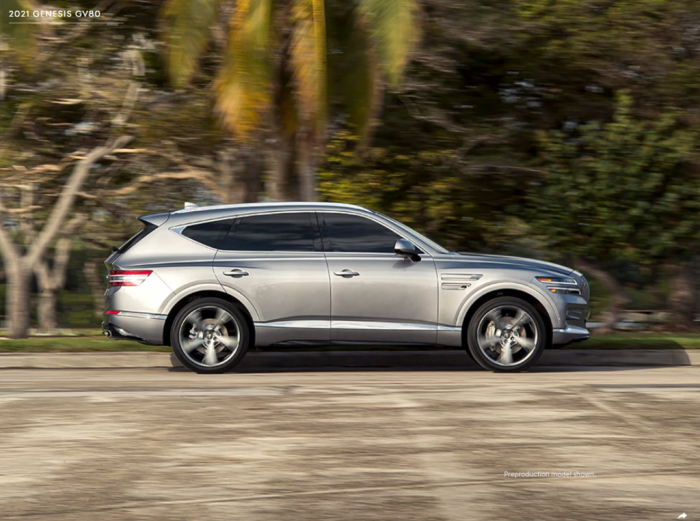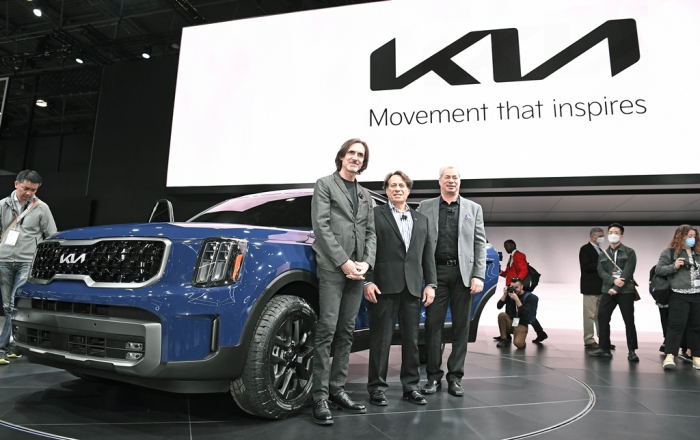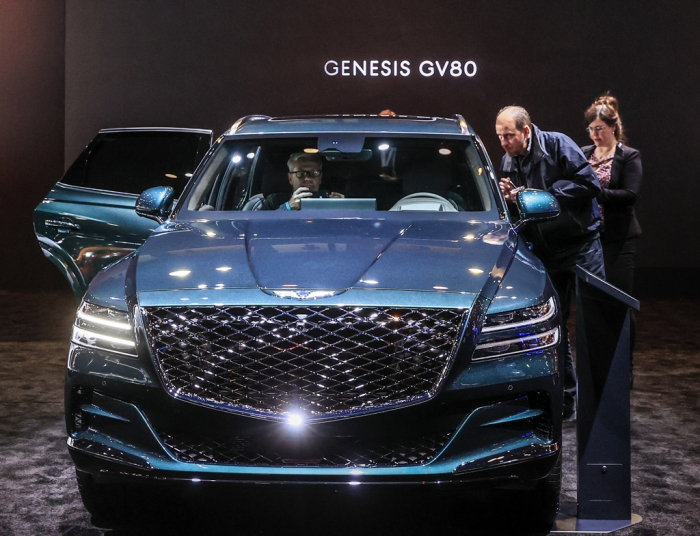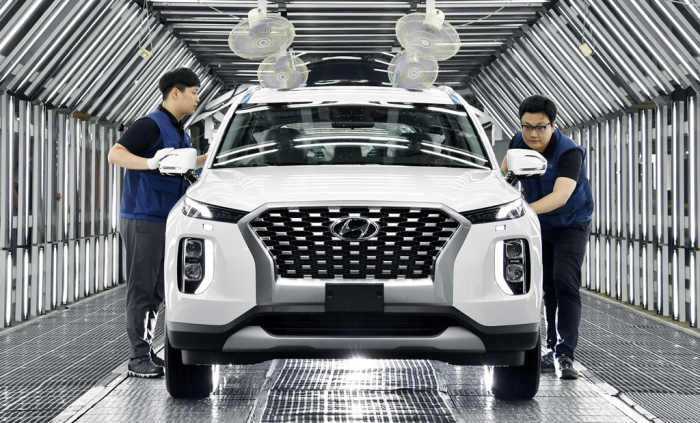Hyundai, Kia see Q1 profits soar, aim for strong 2022 despite dim outlook
The carmakers warn of tough business conditions but vow to meet annual guidance with increased EV sales
By Apr 25, 2022 (Gmt+09:00)
LG Chem to sell water filter business to Glenwood PE for $692 million


Kyobo Life poised to buy Japan’s SBI Group-owned savings bank


KT&G eyes overseas M&A after rejecting activist fund's offer


StockX in merger talks with Naver’s online reseller Kream


Mirae Asset to be named Korea Post’s core real estate fund operator



South Korea’s two largest automakers – Hyundai Motor Co. and Kia Corp. – on Monday posted strong first-quarter earnings, driven by pricey sport utility vehicles and premium Genesis models as well as favorable dollar-won exchange rates.
But the two automaking units of Hyundai Motor Group warned of tough business conditions in the coming quarters, citing a protracted global automotive chip shortage, rising raw material prices and risks linked to the Russia-Ukraine war.
Hyundai said its net profit in the January-March quarter reached 1.78 trillion won ($1.42 billion), up 17% from 1.52 trillion won in the year-earlier period.
Operating profit rose 16.4% on year to an eight-year high of 1.93 trillion won from 1.66 trillion won, while revenue increased 10.6% to 30.3 trillion won from 27.4 trillion won.
“A combination of increased sales of high-end Genesis and SUV models, friendly exchange rates, low inventory levels and reduced incentives for dealers in major markets offset the negative impact of the global chip shortage and higher raw materials prices," Hyundai Motor said in a statement.
Its operating profit margin stood at 6.4%, its highest since 7.1% in the second quarter of 2016.

RECORD QUARTERLY RESULTS FOR KIA
Kia, the country’s second-largest carmaker, posted record sales and operating profit on a quarterly basis.
First-quarter sales rose 10.7% on year to an all-time high of 18.36 trillion won, while operating profit also rose to a record 1.61 trillion won, up 49.2% from a year ago. The operating profit margin was 8.8%, its highest since 9.8% in the second quarter of 2012.
Net profit remained almost unchanged at 1.03 trillion won.
The two carmakers’ strong quarterly results came as car manufacturers around the world continue to suffer from a prolonged shortage of semiconductors used in vehicles.
Hyundai shipped 902,945 vehicles globally in the first quarter, down 9.7% from a year earlier, largely due to the chip shortage and China’s lockdown following the resurgence of the COVID-19 pandemic.
The company also briefly shut its manufacturing plant in Russia in early March as the Russia-Ukraine war further aggravated shortages of automotive chips and other components.

Hyundai Motor and Kia account for some 27% of Russia’s vehicle production, representing the second-highest exposure to the European country, following Renault Group.
Kia said its first-quarter global auto sales dropped a mere 0.6% on-year to 685,739 units.
The Korean currency’s 8.2% fall versus the dollar in the first quarter from the year-earlier period also helped Hyundai’s and Kia's profits, boosting the value of their earnings gained abroad.
OUTLOOK DIM
Hyundai Motor said while it expects the global pandemic and automotive chip shortage to ease, business conditions will remain tough due to China’s renewed lockdown of Shanghai and geopolitical risks surrounding the Russia-Ukraine war, which are boosting raw material costs.
In a bid to build investor confidence, Hyundai Motor earlier this year unveiled ambitious annual guidance that projects a revenue increase of 13-14% and an operating profit margin of 5.5-6.5% for 2022. It also said it aims to sell over 4.3 million cars globally this year, up 10.5% from last year.
“We expect a difficult second quarter, but we have decided to stick with our annual guidance announced in January,” said Koo Za-yong, Hyundai’s senior vice president, during an earnings call on Monday.

After posting record 2021 sales in January, the company said it will spend a whopping 9.2 trillion won in 2022 to ramp up facilities for electric cars and other eco-friendly vehicles.
The company said it will strengthen its EV lineup by launching the Genesis GV60, Electrified GV70, and IONIQ 6 this year in line with increasing consumer preferences for eco-friendly models.
In the first quarter, Hyundai’s electric vehicle sales increased 97.1% from the year-earlier period, while the ratio of its EVs rose to 5% of all cars sold from 2%. Kia’s EV sales rose 14% on year with its EV ratio versus its entire car sales climbing to 6.3%.
Hyundai targets to sell 220,000 EVs this year, up 56.3% from 2021, bringing its total 2022 eco-friendly car sales to 560,000 units, a 33.8% on-year increase.
(Updated with Kia's first-quarter results)
Write to Han-Shin Park at phs@hankyung.com
In-Soo Nam edited this article.
-
 Electric vehiclesIONIQ 5 emerges as EV game changer with industry accolades
Electric vehiclesIONIQ 5 emerges as EV game changer with industry accoladesApr 14, 2022 (Gmt+09:00)
4 Min read -
 Electric vehiclesHyundai to build EVs at US plant; Electrified GV70 to roll out in Dec.
Electric vehiclesHyundai to build EVs at US plant; Electrified GV70 to roll out in Dec.Apr 13, 2022 (Gmt+09:00)
3 Min read -
 AutomobilesHyundai Motor, Kia rank fifth in global electric vehicle sales
AutomobilesHyundai Motor, Kia rank fifth in global electric vehicle salesApr 06, 2022 (Gmt+09:00)
2 Min read -
 Electric vehiclesHyundai accelerates electrification strategy, targets 7% of EV market
Electric vehiclesHyundai accelerates electrification strategy, targets 7% of EV marketMar 02, 2022 (Gmt+09:00)
4 Min read -
 Electric vehiclesHyundai, Kia refine profile with accolades, higher global rankings
Electric vehiclesHyundai, Kia refine profile with accolades, higher global rankingsMar 02, 2022 (Gmt+09:00)
5 Min read -
 AutomobilesHyundai IONIQ 5, Kia EV6 rated top among electric cars in Germany
AutomobilesHyundai IONIQ 5, Kia EV6 rated top among electric cars in GermanyFeb 28, 2022 (Gmt+09:00)
2 Min read


